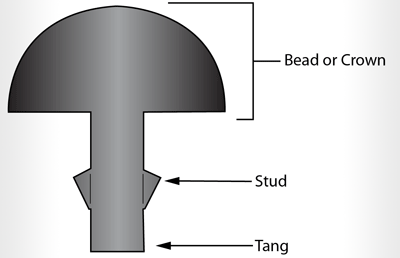|
Electric guitar frets come in all kinds of different shapes and sizes. You may read in your Musician's Friend magazine that a certain guitar has "jumbo" frets. The term "jumbo" refers to the size of the bead or crown of the fret. A piece of fret wire consists of more than just the part of the fret that sticks out of the fretboard: the bead or crown. Here is a diagram of a cross section of electric guitar fret wire. The bead or crown is the top part of the fret that comes into contact with the strings. The tang is the part of the fret wire that is inlayed into the fretboard. Fret wire studs are protrusions that stick out of the fret tang to hold the fret wire in the fret slot. Every guitar has slightly different sized fret wire. Like most specifications on guitars, the size of fret wire is chosen for its playability. Many metal guitarists enjoy taller jumbo frets, while many jazz player may prefer lower frets. Fret height is essentially left up to the player's preference. Play some guitars at your local music shop and see if you can tell the difference between any of the fret sizes. If you can't, I would suggest replacing your existing fret wire with the same size fret wire.

Fret Wire Materials.
Fret wire can be made out of several different materials. The most common fret wire materials are nickel and stainless steel. Many people rave about the tonal differences between nickel and stainless steel frets, but I don't think there is enough difference to tell. Stainless steel is a much more dense material than nickel. This means that stainless steel fret will not wear down as fast as nickel frets will. Conversely, stainless steel frets are difficult to install and repair because of their density. Personally, I would stick with the nickel frets unless you play guitar 8-10 hours a day and you don't want to replace your frets every six months. Otherwise, nickel frets are fine for the average player.
Choosing Fret Wire to install in your Electric Guitar.
There are almost and infinite amount of different sized fret wire available today. How will you choose the right fret wire to install in your electric guitar? I have made a list of things to consider and steps to help you determine what size and style fret wire you want to install in your electric guitar.
Measure your existing Fret Wire.
Once you remove the frets in your guitar, you will need to measure the crown. This will give you a good starting point for choosing a new piece of fret wire. You can measure the crown height and the crown width with a pair of calipers. For instructions on how to remove fret wire, see the fret wire removal page.
Clean the Fret Slot.
You will need to clean the excess glue out of the fret slot from when you removed the fret in order to get an accurate measurement of the fret slot. For instructions on how to properly clean a fret slot, see the fret a guitar with an unbound fretboard page or the fret a guitar with a bound fretboard page.
Measure the Fret Slot.
After the fret slot is cleaned, you can measure the width fret slot. Take a feeler gauge and insert it into the fret slot. The feeler gauge should be tight in the fret slot. Fret slots can range anywhere from .023" - .050" in width.
Choose your Fret Wire.
Now that you know the width of your fret slots, you can choose a fret wire size. Pick a fret wire size that has a tang .002" under sized from the fret slot. The fret bead or crown can be any size. You can either buy the exact same size crown, or you can get a bigger or smaller sized crown. Regardless of how tall or wide you want the crown to be on your new fret wire, you will need to pick fret wire with a tang that will fit in the fret slots of your fretboard.
The steps that I have explained above are just starting points. Each time you choose a fret wire, you will have to test the fret wire to ensure that it fits tightly in the fret slot. You do not want it to fit too tightly because it may cause back-bow in the neck. As I suggested before, I think .002" under sized fret tang is appropriate. The crown size is left up to your preference and playing style.
Now that you have chosen your fret wire, you can finish fretting your unbound fretboard or your bound fretboard | 
